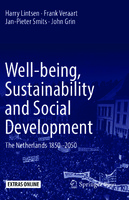Well-being, Sustainability and Social Development
The Netherlands 1850–2050
Author(s)
Lintsen, Harry
Veraart, Frank
Smits, Jan-Pieter
Grin, John
Collection
Dutch Research Council (NWO)Language
EnglishAbstract
This open access book examines more than two centuries of societal development using novel historical and statistical approaches. It applies the well-being monitor developed by Statistics Netherlands that has been endorsed by a significant part of the international, statistical community. It features The Netherlands as a case study, which is an especially interesting example; although it was one of the world’s richest countries around 1850, extreme poverty and inequality were significant problems of well-being at the time. Monitors of 1850, 1910, 1970 and 2015 depict the changes in three dimensions of well-being: the quality of life 'here and now', 'later' and 'elsewhere'. The analysis of two centuries shows the solutions to the extreme poverty problem and the appearance of new sustainability problems, especially in domestic and foreign ecological systems. The study also reveals the importance of natural capital: soil, air, water and subsoil resources, showing their relation with the social structure of the ‘here and now´. Treatment and trade of natural resources also impacted on the quality of life ‘later’ and ‘elsewhere.’ Further, the book illustrates the role of natural capital by dividing the capital into three types of raw materials and concomitant material flows: bio-raw materials, mineral and fossil subsoil resources. Additionally, the analysis of the institutional context identifies the key roles of social groups in well-being development. The book ends with an assessment of the solutions and barriers offered by the historical anchoring of the well-being and sustainability issues. This unique analysis of well-being and sustainability and its institutional analysis appeals to historians, statisticians and policy makers. ; Examines over two centuries of societal development using a novel historical and statistical analysis Features The Netherlands as a case study -- a once rich country currently experiencing high levels of extreme poverty Shows that the way a society deals with natural capital shapes social structure and also has a great impact on quality of life
Keywords
Philosophy; Philosophy of nature; Economic development—Environmental aspects; Conservation biology; Ecology ; Geoecology; Environmental geology; Ethics; Social historyDOI
10.1007/978-3-319-76696-6Publisher
Springer NaturePublisher website
https://www.springernature.com/gp/products/booksPublication date and place
Cham, 2018Classification
Social and cultural history
Philosophy
Ethics and moral philosophy
Ecological science, the Biosphere
Conservation of the environment
Sustainability


 Download
Download Web Shop
Web Shop